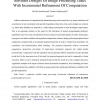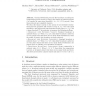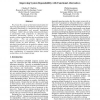67 search results - page 2 / 14 » Graceful Degradation in Multi-Party Computation |
BERTINORO
2005
Springer
13 years 10 months ago
2005
Springer
Fractal proteins are an evolvable method of mapping genotype to phenotype through a developmental process, where genes are expressed into proteins comprised of subsets of the Mande...
TIP
2010
13 years 9 hour ago
2010
Software realizations of computationally-demanding image processing tasks (e.g. image transforms and convolution) do not currently provide graceful degradation when their clock-cy...
EUROCRYPT
2003
Springer
13 years 10 months ago
2003
Springer
Classical distributed protocols like broadcast or multi-party computation provide security as long as the number of malicious players f is bounded by some given threshold t, i.e., ...
DSN
2004
IEEE
13 years 9 months ago
2004
IEEE
We present the concept of alternative functionality for improving dependability in distributed embedded systems. Alternative functionality is a mechanism that complements traditio...
DATE
2010
IEEE
13 years 10 months ago
2010
IEEE
— Ubiquitous image processing tasks (such as transform decompositions, filtering and motion estimation) do not currently provide graceful degradation when their clock-cycles budg...



